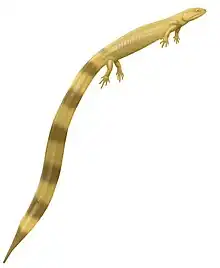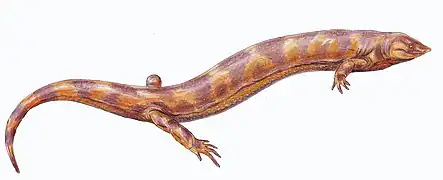| Gymnarthridae Temporal range: Late Carboniferous - Early Permian | |
|---|---|
 | |
| Life restoration of Cardiocephalus peabodyi | |
| Scientific classification | |
| Domain: | Eukaryota |
| Kingdom: | Animalia |
| Phylum: | Chordata |
| Subclass: | †Lepospondyli |
| Order: | †Microsauria |
| Suborder: | †Tuditanomorpha |
| Family: | †Gymnarthridae Case, 1910 |
Gymnarthridae is an extinct family of the group Recumbirostra.[1] Gymnarthrids are known from Europe and North America and existed from the Late Carboniferous through the Early Permian. Remains have been found from the Czech Republic, Nova Scotia, Illinois, Texas, and Oklahoma.[2] Previously they were considered tuditanomorph microsaurs.[1]
Gymnarthrids are relatively elongate with short limbs. The skulls of gymnarthrids are also small, with a single row of large conical teeth on the margin of the jaw (a feature that distinguishes them from other microsaurs). In some genera, such as Bolterpeton and Cardiocephalus, the teeth are labiolingually compressed.[3]
Gymnarthridae was first erected by E. C. Case in 1910 to include the newly described Gymnarthrus.[4] It was placed in a new suborder, Gymnarthria. Case initially considered gymnarthrids to be reptiles, but later recognized them to be amphibians, placing Cardiocephalus in the family.[5] Pariotichus was placed within Gymnarthridae by Alfred Romer after having previously been assigned to the basal eureptilian family Captorhinidae by Edward Drinker Cope.[6]
References
- 1 2 J. D. Pardo, M. Szostakiwskyj, P. E. Ahlberg and J. S. Anderson (2017). "Hidden morphological diversity among early tetrapods". Nature. 546: 642–646.
{{cite journal}}: CS1 maint: multiple names: authors list (link) - ↑ Carroll, R. L.; Gaskill, P. (1978). "The Order Microsauria". Memoirs of the American Philosophical Society. 126.
- ↑ Anderson, J.S.; Reisz, R.R. (2003). "A new microsaur (Tetrapoda: Lepospondyli) from the Lower Permian of Richards Spur (Fort Sill), Oklahoma". Canadian Journal of Earth Sciences. 40 (4): 499–505. doi:10.1139/e02-066.
- ↑ Case, E.C. (1910). "New or little known reptiles and amphibians from the Permian (?) of Texas" (PDF). Bulletin of the American Museum of Natural History. 28: 163–181.
- ↑ Gregory, J.T.; Peabody, F.E.; Price, L.I. (1956). "Revision of the Gymnarthridae: American Permian microsaurs" (PDF). Yale Peabody Museum Bulletin. 10: 1–77. Archived from the original (PDF) on 2010-06-27.
- ↑ Romer, A.S. (1945). Vertebrate Paleontology (2nd ed.). Chicago: University of Chicago Press. pp. 1–687.



